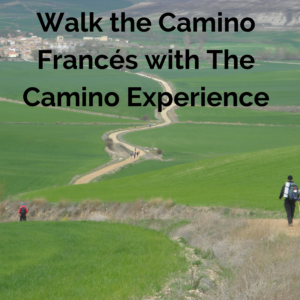Albergue “Etiquette”
Staying in albergues can be a very special and unique part of the Camino experience. It can also be quite trying, as groups of strangers attempt to co-inhabit shared eating, sleeping, and bathing space.
Albergue life isn’t for everyone, but if it’s right for you, here are a few things you can do to ensure you and your fellow pilgrims have an enjoyable albergue stay.
Get the whole story on staying in albergues here.
A Smooth Arrival, About Your Boots, and Other Matters
Have your credencial and payment out and ready as you approach the hospitalero, especially if you are waiting in a queue. The pilgrims waiting behind you are as eager as you are to get checked in and kick off their boots.
If there is a designated spot for boots, leave yours there rather than wearing them into the dormitory room. This keeps the sleeping area clean and removes one source of bad smells.
If the albergue is pay by donativo, or donation, pay when you arrive and check-in so you don’t forget. Donativo does not mean ‘free.’ An appropriate donation is what you would pay for a bed at any other albergue, which is from €7 to €20 – or whatever you are able to pay.
Share – floor space, the clothesline, the bathroom, power outlets, your story.
For Enjoyable Interactions With the Hospitaleros
Treat hospitaleros with kindness and respect. Hospitaleros work very hard to provide pilgrims with a clean and comfortable albergue.
Respect the opening and closing hours of the albergue. This will allow the hosts to clean and prepare the facility for the next night’s pilgrims during the day and to get their much needed sleep at night.
Offer to help. Anything you can do, for whoever is in need.
Keeping it Kind, Clean, and Comfortable for all In the Sleeping Room
Place your backpack on the floor, not on the bed. Your backpack has been out on the trail and is probably much dirtier than the mattress or its cover. This also helps prevent the spread of bed bugs.
Leave chairs clear so you and others can sit on them. Store your things on your bed or in your backpack.
If you have a lower bunk and someone arrives after you who is older, injured, or sick, be willing to offer your spot to the person with the greater need.
Leave the ladder rungs to the top bunk free – no hanging laundry there. Also, keep clear the floor space at the bottom of the ladder so the person on the top bunk can get up and down easily and safely.
If you plan to leave early in the morning, prepare your backpack the night before. Then you can make a quiet exit in the early hours, without waking up your roommates, and finish any packing in the hallway or common room.
Carry a flashlight (torch) and use it for middle-of-the-night bathroom runs and early rising, rather than turning on the room light. Some headlamps come with a ‘Red Light’ feature, which is much easier on the eyes of a tired or sleeping pilgrim.
If you tend to be late to bed, set up your bunk, get out your pajamas, find your flashlight, etc., before everyone else climbs in bed. Say, before you go out for dinner.
Bring a sleeping bag or sleep sack to use on the bed, for sanitary purposes. Keep your bedding between you and the albergue’s blankets – they are seldom washed after each use.
People snore. In shared sleeping rooms, use earplugs and do not harass those who snore.
If you snore, do what you can to minimize the noise you make. If you are the Captain of the Olympic Snoring Team, consider sleeping in private accommodations.
If you are sick, stay in a private room, not in a shared dormitory.
Turn off the ringer on your mobile phone.
Dress modestly and respect that others may not want to see you naked or in your undergarments.
For Peace In the Bathroom
When showering, keep it quick, thinking of the many people who will come after you who will be grateful for the hot water.
When using a shared shower or toilet, always assume someone is waiting to use it and be quick.
The bathroom will be clean when the albergue opens; do your part to keep it that way. Often you will find a mop and bucket; use them for any water that escapes the shower.
A Nicer Kitchen for All
Clean up after yourself in the kitchen. Wash, dry, and put away any dishes you use. Wipe down the counters and sink. Sweep the floor.
If you cook a meal alone or with others, offer to share it with the hospitalero. You won’t believe how appreciated the gesture will be, even if he/she declines.
If you store food in the refrigerator or on the shelves in the kitchen, be sure to label it with your name (if you want it) or ‘Gratis’ (if you don’t). Don’t forget to write the date you are leaving, so the hospitalero knows when food has been left behind intentionally.
Got any other tips? I would love to hear them!



